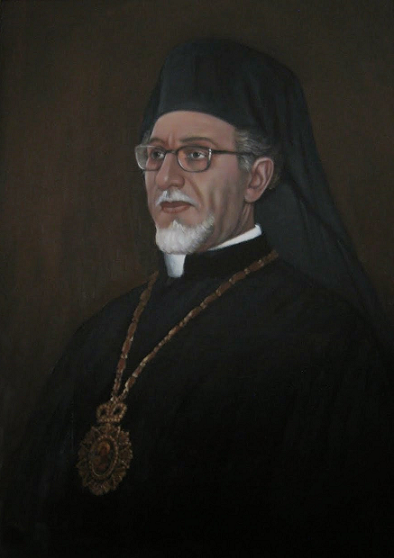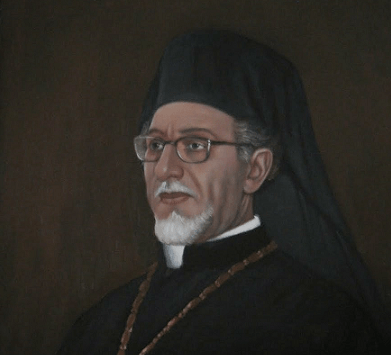An Appeal to the Primates of the Holy Churches of God, and their Eminences the Orthodox Hierarchs:
Instructing us to preserve firmly in everything the Orthodox Faith which has been commanded us, the Holy Apostle Paul wrote to the Galatians: But though we, or an angel from heaven, should preach unto you any gospel other than that which we preached unto you, let him be anathema (Gal. 1:8). His disciple Timothy he taught to remain in that in which he had been instructed by him and in that which had been entrusted to him, knowing by whom he had been instructed (II Tim. 3:14). This is a pointer which every Hierarch of the Orthodox Church must follow and to which he is obligated by the oath given by him at his consecration. The Apostle writes that a Hierarch should be one holding fast the faithful word as he hath been taught, that he may be able by sound doctrine both to exhort and to convict the gainsayers (Titus 1:9).
At the present time of universal wavering, disturbance of minds and corruption, it is especially demanded of us that we should confess the true teaching of the Church no matter what might be the person of those who listen and despite the unbelief which surrounds us. If for the sake of adaptation to the errors of this age we shall be silent about the truth or give a corrupt teaching in the name of pleasing this world, then we would actually be giving to those who seek the truth a stone in place of bread. The higher is the standing of one who acts in this way, the greater the scandal that is produced by him, and the more serious can be the consequences.
For this reason, a great sorrow has been evoked in us by the reading of the so-called “Thyateira Confession,” which was recently published in Europe with the special blessing and approval of the Holy Synod and the Patriarch of the Church of Constantinople.
We know that the author of this book, His Eminence Metropolitan Athenagoras of Thyateira, previously has shown himself to be a defender of Orthodox truth, and therefore all the less could we have expected from him such a confession, which is far removed from Orthodoxy. However, if this had been only a personal expression of his, we would not have written about it. We are moved to do this, rather, because on his work there rests the seal of approval of the whole Church of Constantinople in the person of Patriarch Demetrius and his Synod. In a special Patriarchal Protocol addressed to Metropolitan Athenagoras it is stated that his work was examined by a special Synodical Committee. After approval of it by this Committee, the Patriarch, in accordance with the decree of the Synod, gave his blessing for the publication of “this excellent work,” as he writes. Therefore, the responsibility for this work is transferred from Metropolitan Athenagoras now to the whole hierarchy of Constantinople.
Our previous “Sorrowful Epistles” have already expressed the grief which takes possession of us when, from the throne of Sts. Proclus, John Chrysostom, Tarasius, Photius, and many other Holy Fathers we hear a teaching which without doubt they would have condemned and given over to anathema.
It is painful to write this. How we would have wished to hear from the throne of the Church of Constantinople, which gave birth to our Russian Church, a message of the Church’s righteousness and of confession of the truth in the spirit of her great hierarchs! With what joy we would have accepted such a message and transmitted it for the instruction of our pious flock! But on the contrary, great grief is evoked in us by the necessity to warn our flock that from this one-time fount of Orthodox confession there now comes forth a message of corruption that causes scandal.
If one turns to the “Thyateira Confession” itself, alas, there are so many internal contradictions and un-Orthodox thoughts there that in order to enumerate them we would have to write a whole book. We presume that there is no need to do this. It is sufficient for us to point out the chief thing, that upon which is built and from whence proceeds the whole of the un-Orthodox thought which is contained in this confession.
Metropolitan Athenagoras in one place (p. 60) writes, with full justification, that Orthodox Christians believe that their Church is the One, Holy, Catholic and Apostolic Church and transmits the fullness of Catholic truth. He likewise acknowledges that the other confessions have not preserved this fullness. But later he as it were forgets that if any teaching departs in any respect from the truth, by this very fact it is false. Belonging to a religious communion which confesses such a teaching, people by this are already separated from the one true Church. Metropolitan Athenagoras is ready to acknowledge this with regard to such ancient heretics as the Arians, but when speaking about his contemporaries he does not wish to take their heresy into consideration. And with regard to them he calls us to be guided not by ancient tradition and canons, but by the “new understanding which prevails today among Christians” (p. 12) and by “the signs of our time” (p. 11).
Is this in accordance with the teaching of the Holy Fathers? Let us recall that the first Canon of the Seventh Ecumenical Council gives us a completely different criterion for the direction of our church thought and church life. “For those who have received the priestly dignity,” it is stated there, “the canons and decrees which have been set down serve for witness and guidance.” And further: “The Divine canons we accept with pleasure and hold entirely and unwaveringly the decrees of these canons which have been set forth by the all-praised Apostles, the holy trumpets of the Spirit, and by the Six Holy Ecumenical Councils, and by those who have gathered in various places for the publication of such commandments, and by our Holy Fathers. For all of these, being enlightened by one and the same Spirit, have decreed what is profitable.”
In defiance of this principle, in the “Thyateira Confession” emphasis is made the whole time on the “new understanding.” “Christian people,” it says there, “now visit churches and pray with other Christians of various traditions with whom they were forbidden in the past to associate, for they were called heretics” (p. 12 ).
But who was it that previously forbade these prayers? Was it not the Sacred Scripture, not the Holy Fathers, not the Ecumenical Councils? And is the matter really one of those who were only called heretics and were not such in actual fact? The first Canon of Basil the Great gives a clear definition of the naming of heretics: “They (that is, the Holy Fathers) have called heretics those who have completely broken away and have become aliens in faith itself.” Does this really not refer to those Western confessions that have fallen away from the Orthodox Church?
The Holy Apostle Paul instructs us: A man that is a heretic, after the first and second admonition, reject (Tit. 3:10), while the “Thyateira Confession” calls us to a religious coming together and communion in prayer with them.
The 45th Canon of the Holy Apostles commands: “Let a bishop, presbyter, or deacon who has only prayed with heretics be suspended.” The 64th Canon of the Apostles and the 33rd Canon of the Council of Laodicea speak of the same thing. The 32nd Canon of the latter prohibits receiving a blessing from heretics. The “Thyateira Confession,” on the contrary, calls to prayer together with them and goes so far that it even allows Orthodox Christians both to receive communion from them and to give it to them.
Metropolitan Athenagoras himself gives the information that in the Anglican Confession a large part of the bishops and believers do not acknowledge either the grace of the hierarchy, nor the sanctity of the Ecumenical Councils, nor the transformation of the Gifts at the Liturgy, nor other Mysteries, nor the veneration of holy relics. The author of the “Confession” himself points to those articles of the “Anglican Confession” in which this is expressed. And yet, disdaining all this, he allows Orthodox Christians to receive communion from Anglicans and Catholics and finds it possible to give them communion in the Orthodox Church.
Upon what is such a practice based? On the teaching of the Holy Fathers? On the canons? No. The only basis for this is the fact that such a lawless thing has already been done and that there exists a “friendship” which has been manifested by the Anglicans for the Orthodox.
However, no matter what position might be occupied by one who allows an act forbidden by the canons, and no matter what kind of friendship might be the cause which has inspired this—this cannot be a justification for a practice condemned by the canons. What answer will be given to the Heavenly Judge by the hierarchs who advise their spiritual children to receive, in place of true communion, that which often the very ones who give it do not acknowledge as the Body and Blood of Christ?
Such a lawless thing proceeds from the completely heretical, Protestant, or — to express oneself in contemporary language — ecumenical teaching of the “Thyateira Confession” regarding the Holy Church. It sees no boundaries in the Church. “The Holy Spirit,” we read there, “is active both within the Church and outside the Church. For this reason its limits are ever extended and its bounds are nowhere. The Church has a door but no walls” (p. 77). But if the Spirit of God acts alike both within the Church and outside it, why then was it necessary for the Savior to come to earth and found it?
The care for the preservation and confession of the authentic truth, a care which has been handed down to us by our Lord Jesus Christ, the Holy Apostles and Holy Fathers, turns out to be superfluous in this conception. Although the “Confession” does say on page 60 that the Orthodox Church can “rightly claim at this moment of history to be the One Church that Christ the Son of God founded upon earth,” it does not see any necessity for the inviolate preservation of her faith, allowing thereby the co-existence of truth and error.
 Despite the words of the Apostle, that Christ has presented her to Himself as a glorious Church, not having spot, or wrinkle, or any such thing (Eph 5:27), the “Thyateira Confession” presents the Church as uniting in herself both truth and that which it itself acknowledges as apostasy from it, that is, heresy, although the latter expression is not used here. The refutation of such a teaching was clearly expressed in the renowned Epistle of the Eastern Patriarchs on the Orthodox Faith: “We undoubtingly confess, as firm truth. that the Catholic Church cannot error go astray, and utter falsehood in place of truth: for the Holy Spirit, always active through the Fathers and teachers of the Church who faithfully serve her, preserves her from every error” (Sect. 12).
Despite the words of the Apostle, that Christ has presented her to Himself as a glorious Church, not having spot, or wrinkle, or any such thing (Eph 5:27), the “Thyateira Confession” presents the Church as uniting in herself both truth and that which it itself acknowledges as apostasy from it, that is, heresy, although the latter expression is not used here. The refutation of such a teaching was clearly expressed in the renowned Epistle of the Eastern Patriarchs on the Orthodox Faith: “We undoubtingly confess, as firm truth. that the Catholic Church cannot error go astray, and utter falsehood in place of truth: for the Holy Spirit, always active through the Fathers and teachers of the Church who faithfully serve her, preserves her from every error” (Sect. 12).
Submitting to the new dogma of pleasing the times, the author of the “Thyateira Confession” clearly forgets the instruction of the Savior that if your brother neglect to hear the Church, let him be unto thee as a heathen and a publican (Matt. 18:17), and the same instruction of the Apostle: A heretic, after the first and second admonition, reject (Tit. 3:10).
Therefore, with great sorrow we must acknowledge that in the so-called “Thyateira Confession” there has resounded from Constantinople not the voice of Orthodox truth, but rather the voice of the ever more widespread error of ecumenism.
But what will be done now by those whom the Holy Spirit hath made overseers, to shepherd the Church of God, which He hath purchased with His own blood (Acts 20:28)? Will this false teaching, officially proclaimed in the name of the whole Church of Constantinople, remain without protests by the Hierarchs of God? Will there be further, in the expression of St. Gregory the Theologian, the betrayal of truth by silence?
Being the youngest of those who preside over the Churches, we had wished to hear the voices of our elders before speaking out ourselves. But up to now, this voice has not been heard. If they have not yet become acquainted with the content of the “Thyateira Confession,” we entreat them to read it attentively and not to leave it without condemnation.
It is frightful that there might be referred to us the words of the Lord to the Church of Laodicea: I know thy work, that thou art neither cold nor hot; I would thou wert cold or hot. So then because thou art lukewarm, and neither cold nor hot, I will spew thee out of My mouth (Apoc. 3:15-16).
We now warn our flock and call out to our fellow brethren, to their faith in the Church, to their awareness of our common responsibility for our flock before the Heavenly Chief Shepherd. We entreat them not to disdain our announcement, lest a manifest mutilation of Orthodox teaching remain without accusation and condemnation. Its broad distribution has moved us to inform the whole Church of our grief. We would wish to hope that our cry will be heard.











